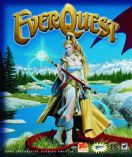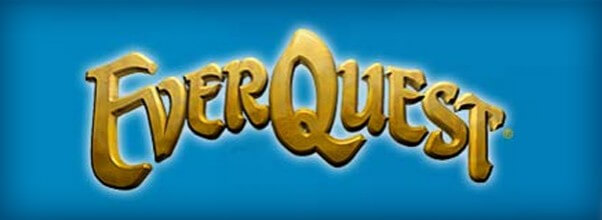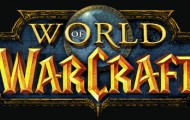 In advance of Friday’s big reveal of Everquest Next (rumored to be released in a playable form – presumably Beta – by the end of the year), many fans have been expressing excitement in discussions around the internet that its gameplay experience might be akin to that of the original Everquest. This is rooted in the fact that many players of the first and second-generation MMOs (roughly, Ultima Online and perhaps its immediate predecessors through to the era of early 2000s games like Dark Age of Camelot, Anarchy Online and Asheron’s Call 2) have been vocally expressing dismay for years that the dominant MMORPG design philosophy changed profoundly with the release and runaway success of World of Warcraft in 2004, with nearly every major big-budget MMO since modeling itself after that title.
In advance of Friday’s big reveal of Everquest Next (rumored to be released in a playable form – presumably Beta – by the end of the year), many fans have been expressing excitement in discussions around the internet that its gameplay experience might be akin to that of the original Everquest. This is rooted in the fact that many players of the first and second-generation MMOs (roughly, Ultima Online and perhaps its immediate predecessors through to the era of early 2000s games like Dark Age of Camelot, Anarchy Online and Asheron’s Call 2) have been vocally expressing dismay for years that the dominant MMORPG design philosophy changed profoundly with the release and runaway success of World of Warcraft in 2004, with nearly every major big-budget MMO since modeling itself after that title.
Newer MMO fans can be forgiven for any puzzlement concerning this viewpoint, having missed the period of time wherein Everquest’s own very distinctive design philosophy set the paradigm for the MMO genre, with immediate successors like the aforementioned early 2000’s games modeling themselves, to varying degrees, on Everquest as a foundation or starting template.
I thought it might be useful and timely to clarify exactly what made Everquest Everquest, or what gave rise to that game’s nearly mythical level of ‘immersiveness’. What exactly constitutes the MMORPG ‘vision’ famously referred to by Everquest lead designer Brad McQuaid?
Introduction
I submit that it was of an MMO that was a world the player entered, virtual reality fully realized, less ‘game’ with all of the arguably negative connotations that word implies (artistically infantile or outright not art at all; designed for children; at heart very shallow as an experience) than alternate universe.
What follows (a newer version of something I originally wrote for the Everquest Next Reddit page) is an attempt to concisely break down the central tenets of Everquest’s design, insofar as this is possible, which made it distinctive. (Note that the points below overlap to some degree, as certain gameplay elements could be said to be representative of more than one of these design tenets, as will be seen below.)
Everquest-style MMOs strive to be more of a living, breathing world — ‘You’re In Our World Now!’ (Everquest’s original tagline) — than a simple ‘game’…
A Careful Separation of the Game World from the Real World
The designers of EverQuest ensured that a careful separation of the game world from the real world was maintained through things like a rich first person player experience (you ARE your character: your character’s ‘body’ reacts to being physically hit as the ‘camera’ or player view shifts, simulating it reeling from a blow; being blinded by a spell literally makes the player’s monitor screen go black temporarily), no option to minimize the game window during play, no transactions for game items with real-life currency, no voice chat which would remove the player from the game world, and no downloadable third-party software allowed.
Creating a Sense of Wonder and Adventure
A sense of wonder and adventure, maintained via features such as:
- No in-game maps or mapping program (so the player by default, unless he prints out player-designed maps, learns the game world through traveling it firsthand and experiencing it)
- A rich, detailed and often emotionally moving storyline which is, moreover, deeply integrated into the game (strange symbols, for instance, exist around the world whose meaning the player can only figure out by thinking through where they’ve been seen and why they might be there given the game world’s history and factions
- Learning the game world’s storyline and backstory/history is done by exploring the world, and speaking to NPCs near and far, rather than reading a pre-made ‘storyline’ text window
- Learning other race languages and raising faction, or favor, with initially hostile monster races or cities can be of benefit to the player by allowing them to uncover not only lore, but also quests and items which otherwise might never be found
- Knowing the game’s storyline and lore can help a player figure out what to do with an unfamiliar or even never before discovered item; notably, events occur game-wide periodically, such as a battle between gods which Permanently changes a zone’s physical makeup and therefore appearance)
- Each race has its own distinctive starting city with its own culture, quests, and ‘feel’
- Meaningful factions system (as just discussed, and further fleshed out below); meaningful separation of race languages; notably, adventuring feels like a truly epic adventure, in part due to the risk inherent (something covered below).
In sum, exploring the world is the only way to really figure out what’s going on, and exploration of the world is not only useful for advancement but is rich and satisfying enough that it can become an end in itself for many players; the player comes to see the game world as a world, their character as an Ogre with a distinct cultural ‘home’ in their home city rather than just as a graphical model with hit points and other statistics attached
Danger/Consequences for the Player’s Actions
There needs to be real penalties for death or reckless behavior, from significant experience loss on death to the ‘dropping’ of all items physically on the character’s body at the death spot/corpse until they are retrieved and the corpse is ‘looted’ by the returning player character, make the player take his character seriously and invest in its well-being with care (this also helps the player identify with his character).
Player leveling and skill advancement should take a non-trivial amount of time and skill; monsters are as a general rule stronger in brute combat statistics than a player character of that level — among other things this element makes players emotionally attached to their characters and invested in them and their accomplishments, and given that it takes skill to advance, makes players proud and feel a real sense of achievement when they accomplish things or gain levels or new items.
Also worthy of note is that given meaningful death penalties, players will feel not only a sense of adventure and excitement upon entering a new or unfamiliar area that appears dangerous, but also fear and caution, precisely as their character would in the situation (further blurring the distinction between player and character in the gameplay experience).
Forced Community
Communities form in MMORPGs when players band together to tackle difficult encounters. Players quickly learn that it is vastly more advantageous to hunt in groups or raids than solo. Community also occurs when you have an economy that runs on direct player interaction, in playerbase-chosen ‘marketplace’ areas where players verbally work out deals on trades and sales of items, rather than an automated, impersonal sales system.
With little or no instancing, so players meet other groups/players in dungeons and there is always a feeling that the world is unified as well as well populated as a real world would be. This not only makes the world feel more alive and ‘real’ with there being so many player characters one encounters, but in getting to know each other in a well populated world, players come to identify with one another and to develop satisfying in-game relationships, two factors that reduce the prevalence of antisocial behavior in the game, in addition to actively fostering friendly behavior (a player who has themselves died in a nasty spot before is demonstrably more likely to help a stranger with their own tricky corpse retrieval)
A Focus on Immersion and Atmosphere in Art and Music Design Philosophy
Art and music with character, atmosphere, richness and memorability as the primary goal; the world has a distinctive and unique visual and music ‘feel’ different than that of any other game
A Sense of Mystery
The idea that the world is MYSTERIOUS and there is always more out there that the playerbase isn’t aware of yet. Such as:
- Ultra-rare spawns, ultra-rare drops (which often are highly sought out for their quality)
- Quests that require that players be creative to solve, or even in some cases discover (while most quests are fairly straightforward, some approaches that might be necessary to discover or solve some more tricky quests could include:
- charming a monster and speaking to it
- learning an unusual language
- raising faction with a hostile monster race and speaking with it and the possibility that some quests have never been found or solved also helps make the world feel meaningful and ‘alive’ in its own right)
- Many hidden areas (behind fake walls; underwater; in a random cave; etc.) and even some hidden zones
- Mysterious markings and symbols in zones that give clues to the game world’s history that players must figure out
Unpredictability
The occurrence of occasional ‘GM events’ or unexpected and spontaneous developer-led events in the game world; very rare monster spawns and drops, as well as those that occur in unexpected zones (some of the best items in the game are found off of very rare spawns that aren’t necessarily of high level or in a high-level zone; you need to kill some non-hostile/’city’ NPCs to get certain drops; etc.)
Freedom in Gameplay
Often considered emergent gameplay, players need more freedom in MMORPGs. Players should be able to attack ANY NPC, invent battle strategies and mechanics like fear kiting (using the spell Fear in combination with a movement-slowing spell to make enemies flee sufficiently slowly that they can be kept up with easily, and slowly killing them, in the hope they’ll die before mana runs out or they are seen by other monsters who would join in) and use them (so long as they’re not exploitative), etc.
Size and Scope
No ‘fast travel’ akin to World of Warcraft today, no in-game maps. The world feels enormous and epic and takes a long time to traverse
The World-Centric Approach
The world doesn’t revolve around the player; the player character is but one person in a very large and realistic world.
- Factions are at war with each other (sometimes visibly seen as monsters will fight other monsters they encounter of a different faction or political alignment)
- Players must actively and creatively discover quests by interacting with the world and NPCs, exploring, or finding very rare items or hidden areas
- Players must use world’s infrastructure (boats, etc.) as any resident of the game world theoretically would have to, no ‘shortcuts’ for the player like fast travel which would suggest that the player character is a ‘special’ member of the game world
- No guarantee that there will not be some very high level monsters in an otherwise low level zone or vice versa (who’s to say there can’t be a sea monster inhabiting an otherwise peaceful, low level lake or ocean zone?)
- Different race cities have different newspapers with different writing styles and opinions based on that race’s characteristics and personality and culture, etc.
Conclusion
This is by no means necessarily an exhaustive list, but I believe that, taken in sum, it hits on the basic essence of what made Everquest so distinctive (its immediate successors took much of its design as a basic starting point, but aren’t generally held to have been quite as ‘immersive’ as EQ, nor did they take after all the tenets listed above to the same degree as EQ did). To put it in the most distilled form possible, the ‘Vision’ was, as this author understands it, precisely a vision of a game which was an alternate world as immersive, atmospheric and engaging as the one we live in in real life. (And indeed it seems that most players of Everquest in its prime — including me — consider it the best game ever made.)
I do not mean to suggest that an Everquest-style game today would have the same effect on contemporary gamers as the original did in its prime, but there is, I believe, an argument to be made (even if it’s not one I necessarily agree with) that with more advanced (graphics and otherwise) technology than existed in 1999, a game which follows the design philosophy outlined above, and realizes its ambitions further given newer technology (richer graphics, virtual reality eyewear) would be able to make a world as rich to today’s gamers as Everquest’s world was to players in 1999 and the early 2000s.
Readers are encouraged, then, to imagine, as an exercise, what a game of this nature might look and feel like given contemporary and cutting-edge technology, especially if blended with newer concepts in MMO design (to use two examples, the “sandbox” and “emergent” MMO design philosophies, which John Smedley has as I understand it indicated will heavily inform the development of Everquest Next, hinted at as being to some degree an Everquest-style game).
Further, the salient point here is that the World of Warcraft MMO design paradigm, or at least the design paradigm the name World of Warcraft is associated with by fans of the MMORPG genre, is rather different than the one which Everquest gave birth or at least (in the case that one believes Ultima Online and other EQ predecessors were to some degree spiritual predecessors of EQ) shape to and which informed the development of most if not all major MMOs of Everquest’s era.
If the video/computer games industry is to continue growing artistically with an aim to creating rich and unforgettable experiences for players, designers could do worse than to take the ‘Vision’ as a starting point in MMO design. (Which isn’t to say future MMOs should slavishly follow Everquest in every detail — it’s worth noting that some of Everquest’s own immediate successors blended some of its design tenets with new and radical, and often brilliant, ideas; and, as just mentioned, it would be very interesting and likely fruitful to explore combining the Everquest-style MMO design philosophy with newer MMO design philosophies.)
Moreover, I believe it is apparent that there is a large sector of the MMORPG fanbase which is not currently satisfied with any contemporary MMO and longs for one of this nature or style. Everquest in its prime had nearly 500,000 subscribers; several of the other contemporary MMOs of the era each had perhaps a third or half that at the same time as Everquest boasted those kinds of numbers. Given this, as well as the considerable hype and sort of mythic status Everquest has attained among newer MMO players who would be excited to try a game of this nature for the first time, it is apparent that an MMO of this style referred to above would not only survive, but flourish in the marketplace.
– Zanakus
The author is indebted to the incisive and often brilliant discussions on Everquest, its legacy and MMO design over at the defunct FoHguild.org website and its current successor Rerolled.org. Many of the ideas in this article were inspired by viewpoints expressed by posters over there. The author would also like to make clear that he has no ill feelings toward World of Warcraft, a game that by all accounts deserved its success based on sheer quality; Everquest, for its part, was long since dead artistically, outright unrecognizable to its original form, by late 2004.




Welcome Zanakus and thank you for your essay! Here’s a brief bio: Ariel ‘Zanakus Kargoror’ Kaplan, known to residents of Norrath as a proud Barbarian Warrior and follower of Rallos Zek, played Everquest from 2000 to 2004 on the Rallos Zek server, and occasionally since on ‘classic’ style servers such as the Macintosh-only Al’Kabor server. In real life he’s currently working on grad school applications, as well as a burgeoning rockstar career 😉
The essay appears to be a hacked down version from a large piece, which would explain some parts being harder to read and comprehend then others.
I have always thought thought that EQ1 could have had a larger player base pre-04 if it was as easy to start off as other mmo’s. When the EQ dev team finally did figure this out, it was much to late to recover from the bleeding player base. The upside of this bleed was a more mature EQ experience, the “children” that continued to play seem to care more about the learning to play their character/class.
EQ was far from easy in the early days and made learning the in’s and out’s much more, stressful? It required a certain amount of intelligence and even more patience to get things done. Persistence paid of big time when it came to creating addition characters, some of those would become the new “mains” when one wanted a class change.
Unlike MMO’s since 2004, that majority of players have the “I want it now” and “entitlement” attitude. The game devs that caved in to this pressure just to attract players, that more than likely moved to another shiny game soon as it twinkled. Lets not forget the all-in-one class games, just so some anti-social butterfly doesnt feel left out, the new boo-effin-hoo generation emerges as weak sobbing know-it-all preach how a game is supposed to be designed. None of which have player EQ1 or even know about.
I have since retired and become content playing games like Skyrim and Banished. F*** this new generation of carebearism. I do have hopes for EQ:N. Time will tell.
I think an all-in-one class game could work great BUT I think it should take over 10 years in real life time to master every single class. If it takes a long time for people to progress then they will be more likely to specialize.
This specialization will help lead people into relying on each other more often instead of trying to do everything themselves. It’s still a possibility for them to do everything by themselves, it will just take a vast amount of time.
The main problem though is that most MMORPG developers have been designing almost everything in their games for short-term instead of long-term. They are too afraid to take any kind of chances. 🙁